THE PEOPLE AND COINCIDENCE:FIVE POINTS RECALLED(George Harold Fulks)
Adjustment to our new home at Five Points and Fire Tower Road was not that difficult for Rummage, Ella, Euphama, Dorcas, Betty Jean and Alice Faye. It was no problem for a five year old boy either. "We don't
have to stay here if we don't want to. I can go back to Kentucky and get into some
kind of work. Let's just try it here and see what happens. The people may try to run us off. We're
from somewhere else."

..................................................................................................................................................................
The Rummage Ira and Ella Belle Fulks family occupied this residence from 1945-1951. In
November of 1951, R.I. Fulks transferred to Okefenokee National Wildlife Refuge near
Folkston, Georgia.
.................................................................................................................................................................
On a February day during year 2006, the pilot of a "Southwestern Airlines" jet had leveled-off at
sixty-thousand feet. I, George Fulks, was a passenger on that flight. On an intercom a pilot announced: "We are now in the jet stream. Our altitude is sixty-thousand feet. We're right on schedule and expect to arrive at Ft. Lauderdale in approximately two and one half hours. Have a pleasant flight." Then glancing from the cockpit and above the tip of that aircraft's left wing, a pilot caught just a glimpse of a pretty little bright red balloon. I spotted that balloon also. As I watched it drifting happily by- its string still attached, my thoughts were: "There's
George." There on that aircraft sat other passengers.They were basically in
the same mood as I. Having no smile, hello, and no time for conversation, there I sat amidst strangers, and they would remain unknown. That's a very lonesome feeling, and life has often been that way for me. As I sat there that way, I halfway wished that the little red balloon had been I, George Harold Fulks. How short and marvelous would be its life. It was fun to see it fly so splendidly; an existence so easy, happy, and comfortable. The little red balloon was going to
Fort Lauderdale too. It appeared, and then it was gone. And for it, the flight was free.
...................................................................................................................................................................
THE PEOPLE AND COINCIDENCE-FIVE POINTS,FIRETOWER ROAD
The government owned house into which we had moved at Five Points was neatly painted and well constructed.
To the south, we faced the main access road for mail delivery and the school bus route. Other than that, very little traffic passed us by. Unlike Western Kentucky, there was no "huckster" or traveling store. Two or three small county-style, general stores were within five miles of our residence. Surprised to learn that the house was wired for electrical power, the family was faced with an awkward
situation. We owned no electrical appliances. As with our former residence in rural Western Kentucky, electrical power was beyond the financial means of many rural-Georgia residents. Appliances such as radios, irons, refrigerators, and washing machines were available, but many people did not earn sufficient wages to purchase them. Buying on credit equaled an obsenity so far as Rum Fulks was concerned. Many in Georgia were without electricity.(1945)"I'll get a few lightbulbs," Dad said:"We'll have to pay an electric bill. That won't be more than six dollars a month. I guess we can afford that."
Situated on about two acres of native grasses were the house and a firetower
used as an observation post. Monday through Friday, Millard Jackson, an elderly man, worked an eight-hour shift atop that one hundred feet high firetower. Mr. Jackson endured a hot and cruel existence in a metal box high-up on the firetower. Paid eighty dollars monthly as watchman, that man was stationed there for reason that lightening and controlled burning within and surrounding the refuge would sometimes result in forest fires. That kind of fire was a definite hazard during the driest months of summer and autumn.
Our water supply there at Five Points was taken from a shallow well. The wellwater was
pumped into the house by a sturdy windmill. Having an odd color and taste, the water was the subject of a warning from our closest neighbor. "Mr. Fulks,the well water here ain't no good. You can't drink it. It'll make you sick if you do." Our only convenient source of water, we continued to use it. Suspected is that the well-water was by some manner contaminated. At sometime during year 1948, some people from the upper Midwest moved into a small house one quarter mile up and down a road that led East. They were from Des Moines, Iowa. They were Robert Vernon Wade, his wife Arvina Elder, and their daughter Margaret Ann. Their daughter was beautiful, charming, and highly intelligent; serving as a teacher of sorts for me- a Tom Sawyer(book by Samuel Clemens) type of personality. Margaret Ann just happened to be in third grade with me at Gray Elementary School. Of course as any energetic boy would do, I took up for her and with her immediately.
After residing in that area for a time, I noticed that Margaret Ann was often ill. She was frequented by ear infections and runny noses- all kinds of symptoms normally associated with allergies and bacterial infections. Margaret Ann also suffered from occasional hallucinations, coughs,what may have been early disease symptoms. Margaret related to me that she had observed devils appearing within her field of vision. And when I looked into the spaces where those demons were reported, I could not see them. Now advanced in age into this decade(year 2000), I was visiting a modern physicians's office and having a routine physical examination when suddenly Margaret Ann Wade returned as a memory, and I asked: "Dr. Bob, are there communicable diseases that might commence with auditory and visual hallucinations?" The Doctor's response was: "Several illnesses do begin that
way. If you ever see devils or hear voices, such symptoms could be caused by bacteria or poison."
I, then made mention of having read Robinson Crusoe by Daniel Defoe and Robinson's illness lasting several days. Then relaying to that physician Robinson Crusoe's
symptoms, the result was some enlightenment. As readers of that book will recall,Robinson had terrible dreams and high fever,
Dr. Bob Mulch resolved in part by his commentary: "malaria!"
Recollection is that during year 1948, Margaret Ann and I, Rummage Fulks and Ella, and teenage sister, Betty entered The Macon Auditorium for a special
treat. The very famous country music performer, Hank Williams Senior, made a personal appearance. Others attending were Marion E. Garvin and his mother and father. (Betty later married Marion E. Garvin.)
During November of that first year at Five Points, my third grade sister, Alice
Faye Fulks, became ill. Diagnosed with diptheria, she spent several days in what was
then Macon's only hospital. Placed under quaranteen, she appeared to have recovered and was allowed to return home.
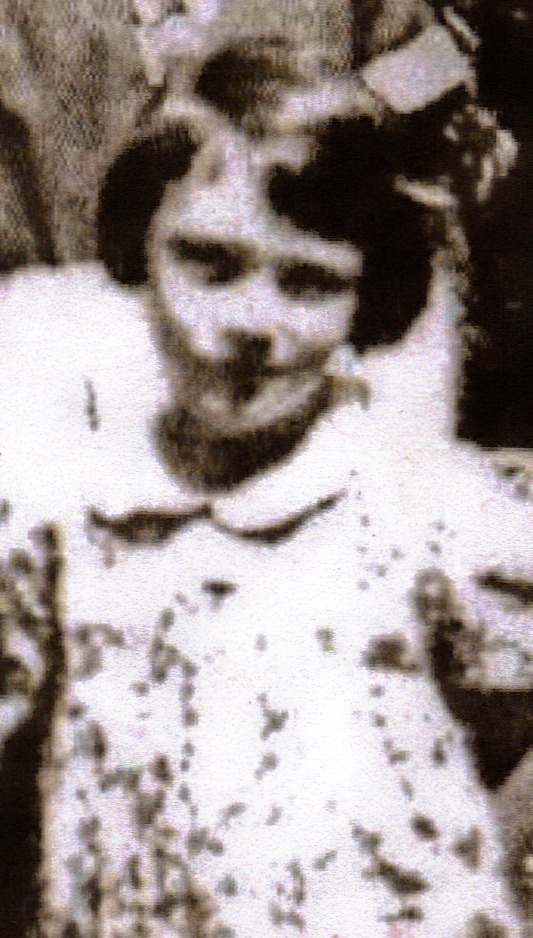
It was on the next day that she was placed back in school. Becoming ill there, my
dad picked her up at the school she attended in Gray, Georgia. Alice Faye was returned to Macon Hospital under the care of Dr. Clay. Again she was placed under
quaranteen. As her five year old brother, I could hear her breathing heavily and
gasping for breath from her hospital room. Leaving Alice Fay at Macon Hospital, we returned to our home near Five Points. Later during that day, our telephone rang. It was a message from the hospital. My sister, Alice Faye Fulks, had deceased.
A dreaded and often killer disease during those times, diptheria was among several illnesses for which humans were at risk.
Returning home from their first day of school, my sisters were excited and enthusiastic. Eleven miles away was the bustling town of Gray,Georgia and its schools. The ride there by schoolbus provided a wonderful experience of viewing the people and unique landscape that had somehow preserved a large part of The Old South and Central Georgia. Cruising
the Gordon Settlement, passing the descendants of slaves and into The Green Settlement,
encountered personality traits admired by most people- humility, cordiality, hope, pride, courage,and determination. With few exceptions, it could be proclaimed that there in Georgia were more
stability and better attitudes for those times during the 1940's. Sensed by most
of those Americans was that life would improve for reason that the long and difficult World War II was near its end. "They have a really nice town and school", my sisters reported. "There's a town called Clinton and it's really pretty. The people who
live there have very large and fine houses". Clinton was a famous landmark in Jones County, Georgia- a remnant of past times; yet preserved for those living in the present. Clinton had been spared damage from Sherman's march through
Georgia during the American Civil War.(1861-1865) My sisters had found it necessary to walk long distances to reach their schools in Kentucky. The four of them were courageous throughout their pursuit of basic education, and their Father, R.I. Fulks never ceased stressing the importance that we all get an education. He would not tolerate suggestion by any of his children suggesting dropping out of school. Rummage Fulks had been forced into dropping-out as a fifth grader in the year 1916 and was forced into cruel farm labor at early age. Our father was among a multitude of youngsters forced to drop out of school during the 1900's-1930's. Several youngsters of those times ran away rather than engage in the hardlabor associated with unmechanized farming practices. ("Farming is the hardest work there is. It's absolutely backbreaking. I'm not gonna work that hard for a living.")(Rummage Ira Fulks)
Within a few days the manager of Piedmont National Wildlife Refuge came to visit us from his headquarters
near Round Oak, Georgia. Still in a trap, a large beaver was lifted from a government vehicle and brought to our front steps for our pleasure.
A heavy load for Mr. Raymond J. Fleetwood to lift, the animal indicated by its bright eyes and
calm composure that it was not in the least disturbed. "A beaver will bite," Mr. Fleetwood said
to us. "Don't put your hands near it."
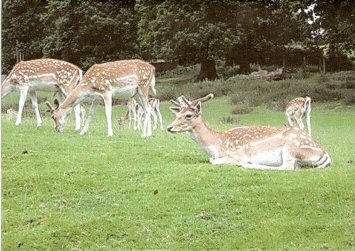
http://www.freedigitalphotos.net/images/s_deer10.jpg
"Mr. Fulks," Mr. Fleetwood said, "I just brought this here for you and your son to see. I'm going to take it to the mouth of Canie Creek and let it go. I plan to trap
more beaver and place them in that area. I want to see if they will built a dam so that we can hold some water in the creek." "And let me tell you while I'm here. The people have hunted and killed almost all of the deer
here in this part of the country. We will send you back to Kentucky Woodlands to pick-up fifty white-tail
as soon that many have been trapped." R.I. Fulks returned to Kentucky Woodlands during the
next Autumn as a part of his duty. Trapping that many Kentucky deer had not posed a problem. A surplus of whitetail had takenup habitat there. The captured deer were tranported by truck from Kentucky Woodlands and released at the refuge headquarters near Round Oak.(Autumn 1945) According to my dad, the deer on a truck were a subject of curiosity
seekers during his five hundred miles journey back from Kentucky. Upon release at refuge headquarters, those deer were reported to have run hastily away;racing for
cover of the woods. For the white tails, it was a move from cedar and hardwood forests of Kentucky into pine laden woods of Georgia. Those deer and the Fulks family had moved to a land much like that of parts of Germany. That was the beginning of a successful effort to restore the deer
population within the refuge and Jones County, Georgia. It was not long before there were many whitetails in the area and surrounding counties.
Providing testimony toward the dedication to wildlife of Raymond J. Fleetwood, then manager of Piedmont National Willife Refuge, is
the fact that he is deceased, yet; records and evidence of his work are posted on the computer net to this year.(2009) It is evident that Mr. Fleetwood loved his profession. His personal attitudes and enthusiasm as a wildlife manager would have been difficult to surpass. Mr. Fleetwood and my dad,
Rummage Ira Fulks, spent many hours in the banding of birds. Parcels of land on the refuge
were cultivated and planted with foods especially for wildlife in order to supplement the diets of the birds and animals native to Piedmont National Wildlife Refuge.
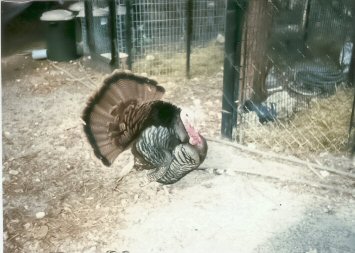
Thanks to Michael P. of Ft Lauderdale, Florida for his permission to use this
image of a wild turkey gobbler. A young cougar rests lazily in its cage nearby.
If any reader happens to be a wildlife manager and a refuge aid as were Mr. Raymond J. Fleetwood and Rummage Ira Fulks,(1945) my advice is not to climb a courthouse roof located in Monticello, Georgia during the hatching season for chimney sweeps. One should not commence to band birds;not on a courthouse roof. It's against the law. If the refuge manager has tendencies to be high strung and temperamental, he should not direct verbal abuse at the officer ordering him off a courthouse roof or become hostile during his arrest, booking, and placement in jail. It's on the books that anyone is to be arrested under those circumtances. My dad and Mr. Fleetwood endured that humilating experience, and I can imagine that the words of the arresting officer were: "What are you doing on the courthouse roof? Come down off of that there! We're having court! You're walking above where we're holding a trial by jury."
Following release from jail, grinning sheepishly with both hands in his pants pocket, my dad related to all of us that incident.
"I tried to tell him we shouldn't get on that roof," my dad said. "It took everything I could do to get them to release us. We had to pay a fine- twenty five dollars each. I don't have any money now. I don't know what we'll do until payday." This writer, Son of R.I. Fulks, has no memory of my dad ever showing such a high state of humility. Apparently, being jailed is a humbling experience.
For a brief time, Rummage and Ella Fulks continued to practice a
lifestyle that had made life difficult and challenging for many rural Americans. Survival of the most fit was a natural law that we and many others were forced to bare. At times, that was not easy. Located eighty miles due-South of Atlanta, Georgia was our home at Five Points.
Atlanta boasted of an engineering college.( Georgia Institute of Technology.) As a college, Georgia Tech had an excellent reputation. Much of the progress made by Georgians is probably result of the fact that well trained engineers attended Georgia Tech and then returned to their hometowns to live and work. Some evidence is available supporting a theory that if the better educated and trained abandon their native habitats, recession may be a side effect. But as I recall, life remained difficult for the Fulks family, and I, George Fulks, was too small to change anything. There might as well have been a dog around the house. For my mother, Monday was washday, and Tuesday was for ironing. Using an iron pot, drawing water from a shallow well, filling that pot and building a fire beneath it, my mother washed clothing in an old fashioned way. My mother, Ella Belle Fulks, manufactured her own lye-soap. But the final product of her hard labor was impressive. What hanged from her clothes line were the very cleanest of garments. Tuesday was ironing time for a family of six. And that was done with dedication and the best of care. Two Cumberland irons heated on a pot bellied stove were the aids used to complete her ironing. Yes indeed! Life was often hard labor for my mother, but she handled it well
Later in life during conversations on those hard times, Mother commented: "Yes, it was hard for us, but there were also many good times too." (Able to recall many of those good times, shared herein are some of them.)
The situation did change, but for a while, the Fulks had an icebox instead of a refrigerator. We would visit the ice house in Gray each Saturday.
Dad would purchase a block of ice weighing one hundred pounds. Placed in the ice box back at Five Points, just a small chunk would remain unmelted on the
following Saturday. That was the method of preserving food for many others in that area and in Western Kentucky from where we had moved. Surprisingly though, multitudes of Americans did not possess even an ice box.
The ice house in Gray had a good volume of business. As noted previously, most
rural residents did not enjoy the luxury of electricity. It was available for those who wished to attain it, but a majority survived without that luxury and electrical appliances. Their houses were not wired, and they could afford the electrical bills and appliances. A point also to be considered was that having homes wired for electricity was a costly job, and trained electricians were difficult to find.
It was the manager of Piedmont National Wildlife Refuge who changed a style of life for us. Noticing during one visit to our home at Five Points that we had no electrical appliances, Mr. Raymond J. Fleetwood commented: "Mrs. Fulks, I can see that you're working so hard here. It doesn't have to be that way. My wife has three electric steam irons. Two of them were Christmas gifts. We need only one.There's two
electric refrigerators in storage at headquarters that nobody's using. There's an old agitator washer at
headquarters that the former refuge manager just left in their house. I'll get them
for you. It shouldn't be that difficult for you." That helped my mother. She began enjoying more leisure, and life did begin to improve for all of us. She and I could walk the roads, visit neighbors, and pick wild fruit and berries. Mother and I experienced quite a frightening experience once. That incident is worthy of recording here. We were walking, and the two of us were picking blackberries. We weren't supposed to have been trespassing in that Afro-Americans' field at all, but because we were acquainted with Charlie, we climbed his stock fence and sneaked into a huge cache of ripened blackberries. Enough berries for two pies had been picked. Then Mother and I trod our way a fence we'd intended to climb and then head back home, but we were a substantial distance in that field. Walking in front of our pathway was the meanest looking bull I've ever seen. Ring in his nose, huffing and puffing, snorting , and imprinting its front hoofs into the Earth, it seemed to communicated to us: "I'm walking too. I'm going
somewhere! You're in my place! What are you doing here?" Well, Charlie's bull
bore a very resemblance to the one I had come to know in a high school literature book. The bull had long, huge horns,, was black, and appeared extremely aggressive.
I would swear in relating this account that there walked the same bull as in Alfred Knops's story entitled Babe And The Blue Ox But fortunate for Mother and me, Charlie's bull was not mean; at least not at that time. How did we determine that the bull was not mean? Charlie, our Afro-American neighbor just happened to be walking in his field at about the same time we met his bull. Then placing both arms around his bull's neck, Charlie talked gently to it and said: "You and me is friends, ain't we?" Greeting Mother and me cordially, we were comforted by what Charlie told us: "This is a fine animal. He's one of the best friends I got. Most of
the time, he's gentle. He's not likely to bother you. Not very often, but sometimes he'll be different. It's according to what mood he's in. Sometimes he'll go crazy. When he gets that way, you have to climb a tree or get over the fence before he gets
to you. Bulls are that way. He's a fine animal. I just love him more than I do most people."
Mother and I reached home safely with the blackberries we'd picked, and of course, she made two blackberry pies.
From Charlie, my dad purchased a Jersey cow for a fair price. Mother milked that
cow each morning. One older sister is remembered commenting about our family situation during those times: "If it hadn't been for the cow, corn bread, and beans,
we would have starved to death during those times." However; the situation was not
that bad for us. As a child, I was never near starvation. Mother was a good cook, and she possessed all the skills needed to provide for her husband and family. Human
nature causes some to exaggerate during difficult and impoverished times.
The cow was a fantastic milk producer. We always had fresh milk and enough for Mother to churn for butter and cottage cheese.
A shipment of White Leghorns arived via United States Mail. Those grew to frying size and provided us with eggs for our personal use.
Prior to his exiting and returning to his home just a half-mile east of Five
Points, the Afro-American adviced us."Mr. Fulks- the well water here is no good. It'll make you sick if you drink it. You will need to find water from a running stream
or build a cistern and catch water from the roof of your house.Sometime during
the summer, you might need to have water hauled for the cistern. Even a cistern will go
dry here. We get a drought here almost every summer."
Learning that we were earnest in efforts to improve our monetary status through work and co-operative behaviors, the people in the area placed some of their attention into
making an effort to assist us in getting along in Jones County, Georgia. Those
in Round Oak, Gray, and Wayside; as well the other rural citizens in Jones County; did
not appear to be threatened by the fact that we were from Kentucky. Many other
residents in that part of rural America shared that part of poverty associated with
not having the ability to earn all the cash needed. A terrifying World War had resulted in additional stress for those who remained in America. Many were afraid that we'd be defeated. The thought of those Germans and Japanese at war with pupose of conquering the world sent a shiver down all our spine. We wanted that nightmare to be concluded. Rummage Fulks was often down to his last dollar prior to government payroll day; the first of each month. (Strange to note is that I faced the same delimna during my career as a teacher. In a few instances, I'd given my last dollar away.)
..............................................................................
Management of Piedmont National Wildlife Refuge changed hands during 1946. Raymond J. Fleetwood transferred to Arizona and was replaced by Donald Ambrosen.
Pictured are Don's daughter and son, Anita and Dania. Dania is sitting on a tricycle
belonging to George Harold Fulks.(on right)
..............................................................................
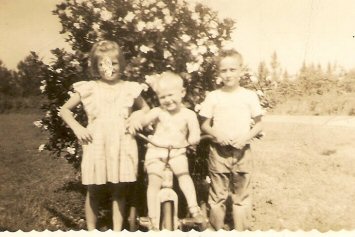
Having baseball, football, and basketball teams at Gray Highschool, the girls
of the Fulks family very quickly adjusted to the school system. No longer necessary
that they walk great distances to reach their school. a schoolbus transported them
back and forth each day. Rides to athletic and other school events could usually be found.
School. School lunches were 15 cents daily and good discipline was maintained in the
classes. Euphama, Dorcas, Betty and Alice Faye returned home in good spirits and began to make satisfactory progress in their studies, and I personally contribute those
attitude changes to my conviction that Georgia had elected an excellent Governor.
Herman Talmage. Funds for public schools and colleges were increased, and that governor was a strong supporter and spokesman for education. Georgia was
able to build many new schools, improve teacher training, improve curriculums and
to hire more teachers. (All the teachers I met were splendid.)

A special "thank You" to http://ecx.images.com for use of this image//8-15-08
For most rural Americans, Saturday is the day chosen for going to market and for entertainment. Showing of Hollywood movie releases would fill the theatre at Gray on Saturday evenings. It was there that all of us learned to love such movie idols as Roy Rogers and Dale Evans, Gene Autry and Tom Mix, Lash Larue, Abbott and Costella and George O'Brien; among several others. If special movies were featured,
the Fulks would load -up and ride twelve miles to the theatre at Gray, Georgia. First, we'd make a stop at" Dairy Queen" and enjoy icecream cones and cheap hamburgers. A Roy Rogers or Gene Autry show might result in standing room only. Any preview showing a
ridiculous content would be rejected by Dad. We would not be in attendance. "The Boy With Green Hair" was a show I wanted to see, but Dad wouldn't take us. In Dad's words "that's the silliest thing I ever heard of. A boy with green hair? What difference does it make?"
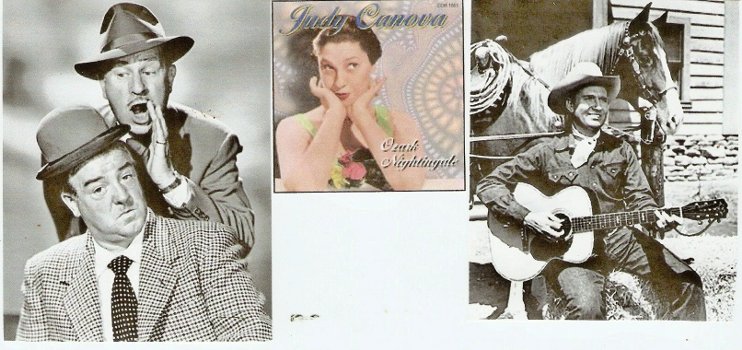
<
Approximately eighteen miles west of Five Points was a large town that was host to a minor league baseball team. Dad and I loved to play and watch baseball.
In several instances, the Brocklyn Dodgers(owners of the Peaches) would visit and play nine innings with their farm club. My father, mother, and I became fans of the Peaches. We attended many of their Sunday baseball games. Some of the baseball greats we watched were Roy Campanella, Peewee Reece, and Larry Doby.Larry would swing at a ball with great gusto. I think he played second-base for the Dodgers. Those major and minor leaguers were fantastic players. MISS LIZZIE
Without sharing our experiences with Miss Lizzie, my accounts of experiences there at Five Points would not be nearly complete. Bicycling east towards the Gordon Settlement, two female companions and I made frequent visits to this wonderful lady. "I was born the day before the slaves were freed," she would say to us often.(Jan 1,1863..Emancipation Proclamation signed)
Devoting a large part of each day for prayer, Miss Lizzie was able to survive with little income. By growing garden vegetables, keeping several chickens, and receiving
assistance from black and white neighbors who loved her, she was able to survive happily there in her tiny house off aa red-clay road before one reached the Gordon Settlement. Miss Lizzie was a remarkable lady. It was her faith and kind nature that made her an instant success with all her neighbors. Miss
Lizzie was an amazing and unforgettable personality. I'm pleased that I had the joy of meeting her during my childhood. She is a part of my life that possesses me for a time every day.
Those Georgia young men became strong with their methods of livelihood. Some worked at sawmills or hauled pine logs. Forestry, lumberiong, and agriculture were their mainsprings. There were many jobs at minimum wage; and a handful that paid well. For most Americans, there was a living wage. In order to get the higherpaying jobs, one would have needed to move from rural America to the larger cities. That's not easy to do for a country boy. "I Wanna Go Home."(song and lyrics by Michael Buble) One thing I remember about the "good old boys" is they had organized Sunday baseball leagues. Round Oak played against Juliette, and that game was the favorite
of many people in Jones County. It brought the Fulks to Juliette on many a Sunday,
and we had a lot of company.
Candy and soft-drinks were available for a nickle. There were hands reaching into icecold washtubs for "Orange Crush, Grapette, and Nehi;" my favorite drinks. For
medicinal purposes, I occasionally choose "Dr. Pepper." That choice would send my daddy into a state of shock, but my request was not refused.
But anyway, based on enthusiasm emerging from fans attending those baseball games, one would have suspected
he were attending "the Baseball World Series." Few errors were made. Many balls
disappeared completely out of sight- into a river; never seen again.
A few disputes over a pitch or an out might occurr. There'd be a brief stop in play. A fist or two would be formed, and faces would turn red. Then someone would proclaim, "Look, now- we're friends here, and this is not "the World Series." As far as I know, there was never a fight; just a few words. Some of those players were sufficiently strong
that I feel that they could have entered the minors or majors. There's almost surely
politics in baseball. Some of those players may have become professional. I just don't know. Of course, it's somewhat difficult for many to run the bases. Later, as a teen and young adult, I could never accomplish that feat.

Image of "fox" used from http://us.123rf.com/ photography of brian. "There was an outbreak of rabies during our residence in Jones County, Georgia. Pedestrians carried large clubs as protection against rabid animals. In brian's photo of a red
fox/ The fox is impressed by the delivery of our chicks. Its sense of smell, vision, hearing, and intelligence will help it survive among men and after all men are gone.
It was a day in March of 1945 there at Five Points and Firetower Road that the
U.S. Postman stopped at the Fulks' mailbox and unloaded a cardboard box containing fifty peeping- yellow chicks. Placed on the back porch and watered and fed, they grew rapidly in size. Soon they were removed to the chickenhouse
and kept there; and a few weeks later turned into our yard surrounding our house. As in Kentucky, in less than one month, it was necessary that we take care that we did not step in chicken shit as we walked,worked. and played in the yard. The Fulks' were farmers again. We had a milkcow and some chickens.
Becoming friends with two successful farm families and gardeners, we squeezed
our way into plenty of fresh vegetables, produce, pecans, and invitations to lunches
and dinners. Peaches, peas, and rice were produce and fruit items that were, no doubt, some of the best in the world. We learned to love them. The cantaloupes and melons there in middle Georgia could not be equaled by either size or taste. Several farmers and gardeners we knew also produced pomegranites and figs. Field corn in season was
grown in such quantities that there was plenty to sell, give away; and for animal
feed. Many of the younger teens were at least partly mechanized in their farm operations. Those displayed an interest and love of farming and forestry. Sharing some of their bounty with
all the poor, these young Georgia farmers were trained by their agriculture teachers
in the public schools. Few families in the Jones County area stayed hungry for long. "Ask and ye shall receive."
CLAY AND EFFIE MAYNARD
Among the best friends of Rummage and Ella Fulks were Clay and Effie Maynard. Owning and working a farm less than two miles from Five Points, they were dedicated to their farm and
homeplace. Clay and Effie were people who preferred to remain in isolation. In that manner, they were able to enjoy a minimum of social conflict. It was impossible to get Clay or his wife
Effie involved in any negative conversation on the subject of the society and their
neighbors. Those two simply let everybody alone. Present interpretation of childhood experiences are that Clay and Effie loved life, nature,
farming; and that section of rural America. Love of life was evidenced by their fear of lightning, tornadoes, and their tranquil adjustment to their farmland, home, and environment; a tiny piece of rural Georgia. Clay had constructed a large and strong shelter for
protection against twisters. The Maynards were very personable people. My daddy, mother, and I adored
them, and we joined them by invitation often for homemade icecream parties and late night cardgames. No gambling was involved. Their home was lighted after darkness by kerosene lamps. Rural Georgia was seldom a quiet place; either by night or day. In the darkness on the Maynard farm, I loved to sit on their front porch as a child and listen to the
sounds of the creatures of the night as the adults played set-back. One could hear barking of foxes and hounds, crickets and katydids, frogs and toads, and the owls and other birds that haunt the night. Those were splendid, and I loved them all; the chuck-wills-widow, the shining eyes of something unknown, a rustling sound in brush, the moon and stars testifying to the creativity of whatever made us all; that gifted life.

Image compliments of http://www.freedigitalphotos.net/images/s-ow14.jpg
Having no children, Clay and Effie Maynard were gentle and kind to those youngsters who visited their home. The two of them had the habit of passing a
nickle or dime into the pocket of any child who visited. I wish I had saved some of those barber dimes, quarters, V and buffalo nickles. I spent them soon for orange crush, Nehi, and candy.
MORE ON MY FRIEND CHARLIE>
Gold deposits existed in small amounts within certain areas of the Piedmont National Wildlife Refuge. The presence of both mica and flakes of that mineral embedded within large and small quartz rocks would have made it possible for one to
have removed two dollars worth of that precious mineral daily. A few people engaged in prospecting on a small scale. Charlie ( the man who sold the Fulks' a cow)
relayed to me that he had found several places to get gold and
that he had accumulated what might amount to $150 in gold dust. Having a place on his farm where no-one was allowed to enter, he was probably more successful than he indicated. Tried and known methods of crushing rock and removing gold flakes are numerous and
effective.Charlie, the gold prospector, farmer, and humanitarian was a kind and humble man. I was then, just a child, and he and I remained good friends. Paying little or no attention to his skintint, I realized then that nature had provided him with a dark shield by which to protect his skin from harmful radiation. No-one had to teach me that. I respected Charlie among all of my other acquaintenances. Charlie, Margaret Ann, and I would often encounter each other as we trod along the roads and into wooded areas.
Fearless outdoorsmen were among the words one could use to describe the three of us. Our Afro-American friend did some hunting for rabbit and squirrel on the wildlife refuge, but no-one attempted to issue to him a violation. Needing food for his family, squirrel and rabbit were both abundant game. Wild turkey were not endangered by Charlie. It's difficult to close distance on those birds- masters of elusiveness. That blackman claimed to possess the power of magic. That he couldn't perform magic cannot be proved by me. One of his prized belongings was a "hairball" from an ox. Simple faith may be the
determining factor in the use of any meta-physical concept.(Einstein:"Imagination is more important than knowledge.") By practicing a form of magic utilizing "the touching with hands" and scriptures from either The Christian Bible or The Koran, Charlie remained forever a loyal friend to me. I was too young to understand his variance in the use of metaphysics in his life. That was a portion of his foundation, and it helped him survive under sometimes difficult circumstances.
========================================================
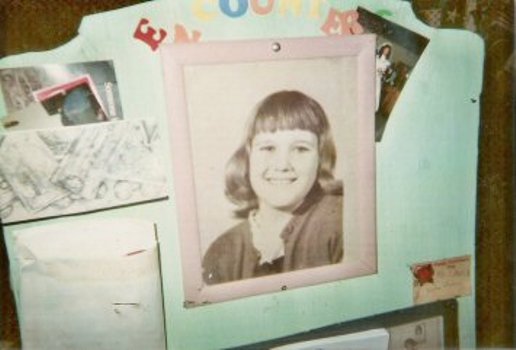
MARGARET ANN WADE, DES MOINES, IOWA
Sharing with me much of my time there at Five Points was a girl I considered the most
beautiful in the world. I never hesitated to tell her how I felt. In one instance, she had recently returned home from a one-month visit with her grandparents in the farm country of Iowa. (The farm was not far from Des Moines.) Once on the day following her return from Iowa by train, she and I walked a mile or so onto a side-road reaching into a pine forest. Trodding our way past a large peach orchard and a patch of tasty, wild strawberries, she and I took turns carrying a large picnic basket filled with things Margaret Ann had labeled "goodies." That basket was covered by a tablecloth. Part of the fun I had was seeing her spread the tablecloth
and expose to me what she had fixed for our picnic lunch.
Included were some of her favorites- banana and mayonaise sandwiches, gingersnaps. angelfood cake, potatoe chips, and "kool-aid."
Margaret Ann had chosen a spot for us to layout our lunch. We were in the front yard where once had stood a house, but only ashes and a chimney remained of a structure that had burned-down at a time in the past.
Spreading the tablecloth on the ground and covering it with the food and drink she had brought,we sat and talked; enjoying our lunch
in a state of peace and solitude. Although we were third graders, our conversation was not what one might have expected of children. I recall asking Margaret, "If you had been alive during the civil war, who would you have fought for, Margaret?" My companion replied, "I'm from Iowa, George. I think I would have been a Yankee." In reply, I recall
saying, "I think I would have also fought for the North, Margaret. I don't think that
people should have been slaves. Would you want to have to work for somebody and not be paid and not free to go wherever you wanted? Margaret answered "George, if you had lived in the south, you would have had to fight for the Confederate States of America. That's the way it was. My grandfather explained that to me.You
had to go even if you didn't want to. Not many people even wanted to go to war. The only way to avoid the it was to be sick, crippled, too old, or to run away to California. Some did that." Then I said, "I guess that's right Margaret. I hadn't thought of that. (This writer was involved as a third graders in very few instances of deep thought.) I don't want to kill anybody, though. I don't think I could, because I don't hate anybody."
Soon finishing our picnic lunch, the tablecloth and basket were abandoned. The two of us commenced to explore the area that was the setting for a burned-out homesite. We found patches of garlic, ginseng, and flowering bulbs and bushes that had once adorned the yard of a proud
owner. Similar to time travelers, our childhood imaginations were stimulated by thoughts of who might have dwelled there
and what life had been like for them. Did they have children such as we? Were they "burned-out" during the civil war? The feeling as if there were a strange presence enveloped us.
That sense was accompanied a gentle breeze and a sudden chill. That was not an uncommon experience for children in wilderness areas. Despite this omen, we continued there for a time.
Later returning to sit on the spread-out tablecloth, our conversation is lost with the passage of that time during the 1940's. Our venture into the land of happiness
was soon to end abruptly and frighteningly. There emerged an all encompasses burst of whitelight. For an instant, it hanged over our heads as a bulb of transluscence. Then it increased in size and
encompassed that entire area of the homesite. The light over our heads shone with a brillance affecting our distant vision. Margaret Ann, then commencing to scream, grasped the spread tablecloth from the ground and stuffed it hurriedly into the picnic basket. As we retreated as fast as our legs could carry us, we looked back into the area we had been. That entire whitelight burst wide-open, exploded, and scattered; falling to the earth into what must have been millions of tiny pieces-
minute white raindrops. If Margaret Ann shared that
incident with anyone, I don't know. It was an event that defied my ability to communicate. It is difficult now; fifty years later. What was the lightrain and its caused remains a mystery. That was a unique experience the two of shared as nine-year-olds.
For only a breath and a sigh did the Fulks family reside there at Five Points-Fire Tower Road.[1945-51} The meetings of all those people in Georgia were chance encounters- "coincidental." As the five intersections existing there, many
people chancing-upon each other were removed to different times and places. The Wades transferred to St. Marks, Florida; and the R.I. Fulks to "Okefenokee Natrional Wildlife Refuge." By 1950, sisters Euphama, Dorcas, and Betty had completed highschool there at Gray, Georgia
and gained independence. Soon the three Fulks sisters were married and no longer living in the household of Rummage, Ella, and George Fulks. It was during 1951 that my father transferred to Okefenokee. By that time, I had two wonderful neices, Cheryl Jackson and Wanda Hallman. Sister, Alice Faye Fulks had deceased back during November, 1946. The Fulks slowly overcame the grief of having lost a member of the family. Five Points is now a lonely, empty space. The firetower, windmill, and house where the family dwelled are missing from that landscape. Possessed by a
forest; not a hint of existence of Margaret Ann Wade, Arvina Elder
Wade, Or Robert V. Wade is evident. Yet I am there. It's just a pinch that I recall of those times. That's all one needs. It was a happy time for many of the suns and moons that shone over that part of Georgia from 1945-51. Those sprinklings of a
sugar-coated childhood can be included within this short time and space. My acquaintenance, Margaret Ann Wade, is deceased. That is not an image that can be erased. I, George Fulks, missed her companionship. Her memory remained concealed within the recesses of what might be considered a dull mind. I'm calling it back. Somewhat of a skintag I carry, a question now arises. Which skintag is it? Not one day of my life passes that I do not envision the beautiful faces of Margaret Ann Wade and Avina. What is communicated here cannot echo a negative response from either. Research indicates that the two are deceased; and so is Robert Vernon Wade. That was such a fine story. There were sad and happy times. In a sense, it's one I could and never would have written. I met a girl from DeMoine, Iowa. How could such a thing have happened? It's beyond my power to change the beginning, much of its content; or ending of such a story. I've come close to agreement with the concept that "the book of life is finished from its beginning to its end.
We cannot change it."(Thomas Chesser) That idea was presented so often, this writer cannot help but consider it.
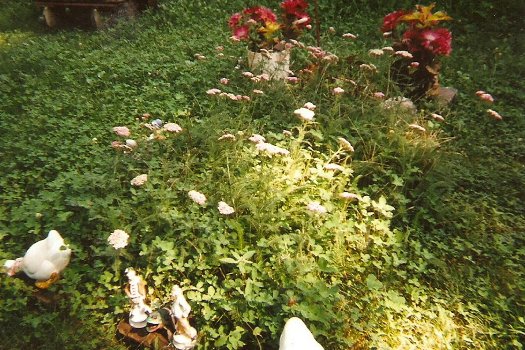
I, George Harold Fulks, have learned to read, write, and do arithmetic. Along with that, I've mastered in part a course helpful in the maintenance of peace and tranquility within a lifespan. I learned to love those people- Margaret Ann Wade and her family. They were known in Jones County,
Georgia as some of those Yankees. If one chooses to interpret literally, it is cannot be claimed, as many, that "I have learned to play a good second fiddle." As a confirmed "agnostic," I herein proclaim, "I never learned to play fiddle at all! Did you? I'd be delighted to here you play."
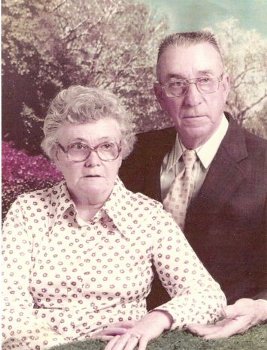
Rummage Ira and Ella Belle Abbott Fulks/about 1978
MARGARET ANN'S MOTHER, ARVINA ELDER WADE
Arvina Elder Wade was Margaret Ann Wade's mother. Eagle Grove, Iowa was host to her beginning, and I, this writer, searched for and read of her ending. If that ending was a sad one, I know not. Recalling some of the words to Arvina's favorite song, it's one I will remember as long as I live. Sharing that listening experience with Arvina as her daughter, Margaret Ann Wade, visited relatives in Iowa farm country, the song is my choice for ending this story. That's a good ending for my account of our experiences there on Piedmont National Wildlife Refuge. Margaret Ann and I were two of the wild creatures there. I still walk there as surely jade is green. ( "Irene. Good night, Irene.Irene. Good night.Good night, Irene.Good night,Irene. I'll see you in my dreams.Sometimes I live in the country.Sometimes I
live in town. Sometimes I take a great notion to jump in the river and drown.")
Those are lyrics from a song written by Huddie Ledbetter and John Lomax. The song was very popular during the late 40's and early 50's.
"You'll never be a man, George. You'll always be just a little boy."
|